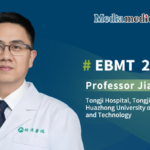
Editor’s Note: On the morning of March 28, the 34th Annual Meeting of the Asian Pacific Association for the Study of the Liver (APASL 2025) officially opened. During the keynote session, APASL 2025 Scientific Committee Chair, Academician Jiahong Dong of Beijing Tsinghua Changgung Hospital, delivered a keynote speech titled “Precision Surgical Treatment of Liver Diseases” and participated in an in-depth interview with International Hepatology. In his address, Academician Dong presented IDEAL—China’s first multimodal intelligent system for precision surgical decision-making in liver diseases. He explained how IDEAL enhances the accuracy, safety, and minimally invasive nature of liver surgery, offering patients greater health benefits. Dong also emphasized the transformative role of digital technologies in surgical care, predicting their impact across clinical evaluation, surgical planning, decision-making, and data management, thus accelerating innovation in the field of hepatobiliary surgery.Hepatology Digest: In your keynote, you highlighted the advantages of precision liver surgery over traditional methods. Could you describe how IDEAL, the intelligent system developed by your team, contributes to achieving this level of surgical precision?
Academician Jiahong Dong: At Beijing Tsinghua Changgung Hospital, our Hepatobiliary and Pancreatic Center partnered with SenseTime to co-develop IDEAL, short for Intelligent Decision-making Enhanced Advanced Liver-surgery. This intelligent system is specifically designed for complex hepatobiliary conditions. IDEAL leverages the power of large AI models and advanced algorithms to analyze high-dimensional datasets. These datasets include a comprehensive range of clinical omics, radiomics, pathology omics, and life omics data. Thanks to its strong analytical capabilities, IDEAL is able to deeply interpret these complex data layers. Using AI’s reasoning and decision-making abilities, the system constructs a digital twin of the patient’s liver, enabling surgeons to visualize the structure with exceptional clarity and accuracy. What makes IDEAL truly groundbreaking is its alignment with the core principles of precision surgery and what we call the “3M” paradigm—maximum preservation, minimal invasion, and meticulous management. Its decision-making capabilities go beyond the cognitive limits of even the most experienced clinicians. It performs a detailed, three-dimensional analysis of the liver’s vascular structures, tissue layout, and lesion distribution, allowing for the design of an optimal surgical plan. This plan aims to completely eliminate the tumor while preserving healthy liver tissue and minimizing trauma. By elevating the precision, safety, and minimally invasive nature of liver surgery, IDEAL empowers surgeons to perform multi-target optimized procedures, ultimately maximizing patient recovery and outcomes. Its introduction marks the beginning of a new era in intelligent hepatobiliary surgery.
Hepatology Digest: How do you see artificial intelligence and big data shaping the future of precision liver surgery, and how will these technologies continue to drive innovation in the field?
Academician Jiahong Dong: Digital technology plays an indispensable role across the entire surgical process. It enables a new level of support at several critical stages, from disease evaluation and clinical decision-making to surgical planning, operative performance, and postoperative data management. At the same time, it empowers surgeons across four dimensions—intelligent perception, cognitive understanding, decision-making, and operative execution. In the field of precision surgery, we place particular importance on achieving a fine-tuned balance among three key goals: complete lesion removal, organ preservation, and trauma control. Achieving this balance is crucial for ensuring surgeries are safe, efficient, and minimally invasive. It is also fundamental to maximizing a patient’s recovery and long-term health outcomes. Smart technologies offer surgeons capabilities that go beyond what the human body or mind can achieve alone. These tools can significantly enhance both physical and cognitive performance, supporting doctors in making more precise clinical judgments and executing more refined surgical interventions. They also assist with effective postoperative monitoring and data analysis. From preoperative planning to intraoperative navigation and follow-up care, the integration of intelligent systems allows for improved surgical precision and personalized treatment strategies. In short, the fusion of digital technology with precision liver surgery represents a revolutionary leap forward. It enhances both the technical execution and the clinical outcome of surgical treatment. As smart technologies continue to evolve, we are entering a truly transformative era—one in which precision liver surgery becomes not only possible but standard.


